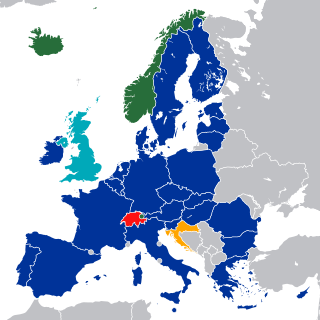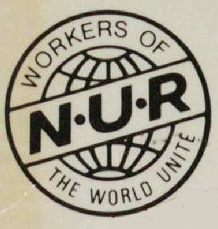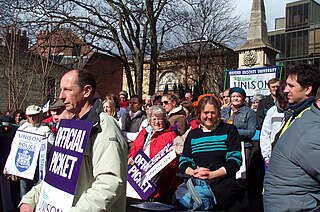Related Research Articles
A trade union, often simply called a union, is an organization of workers who have come together to achieve many common goals, such as protecting the integrity of their trade, improving safety standards, and attaining better wages, benefits, and working conditions through the increased bargaining power wielded by the creation of a monopoly of the workers. Trade unions typically fund the formal organization, head office, and legal team functions of the trade union through regular fees or union dues. The delegate staff of the trade union representation in the workforce are made up of workplace volunteers who are appointed by members in democratic elections.

The European Economic Area (EEA) was established via the Agreement on the European Economic Area, an international agreement which enables the extension of the European Union's single market to member states of the European Free Trade Association. The EEA links the EU member states and three EFTA states into an internal market governed by the same basic rules. The United Kingdom benefits from this relationship during the transition/implementation period planned by the treaties. These rules aim to enable free movement of persons, goods, services, and capital within the European Single Market, including the freedom to choose residence in any country within this area. The EEA was established on 1 January 1994 upon entry into force of the EEA Agreement. The contracting parties are the EU, its member states, and Iceland, Liechtenstein, Norway, and the United Kingdom.

The National Union of Railwaymen was a trade union of railway workers in the United Kingdom. The largest railway workers' union in the country, it was influential in the national trade union movement.

The Association of Teachers and Lecturers (ATL) was a trade union, teachers' union and professional association, affiliated to the Trades Union Congress, in the United Kingdom representing educators from nursery and primary education to further education. In March 2017, ATL members endorsed a proposed merger with the National Union of Teachers to form a new union known as the National Education Union, which came into existence on 1 September 2017. At that time, approximately 120,000 individuals belonged to the union, making it the third largest teaching and education union in the UK. ATL had members throughout England, Scotland, Wales, Northern Ireland, the Channel Islands, the Isle of Man, and British Service schools overseas.

Trade unions in the United Kingdom were first decriminalised under the recommendation of a Royal Commission in 1867, which agreed that the establishment of the organisations was to the advantage of both employers and employees. Legalised in 1871, the Trade Union Movement sought to reform socio-economic conditions for working men in British industries, and the trade unions' search for this led to the creation of a Labour Representation Committee which effectively formed the basis for today's Labour Party, which still has extensive links with the Trade Union Movement in Britain. Margaret Thatcher's governments weakened the powers of the unions in the 1980s, in particular by making it more difficult to strike legally, and some within the British trades union movement criticised Tony Blair's Labour government for not reversing some of Thatcher's changes. Most British unions are members of the TUC, the Trades Union Congress, or where appropriate, the Scottish Trades Union Congress or the Irish Congress of Trade Unions, which are the country's principal national trade union centres.
The National Amalgamated Coal Workers' Union was a trade union in the United Kingdom which existed between 1889 and 1922. It represented coal porters and carmen.
The Municipal Employees' Association was a trade union representing local government workers in the United Kingdom.

Service Employees International Union, Local 32BJ, is a branch of Service Employees International Union headquartered in New York City representing over 175,000 members in ten northeastern states, Washington, D.C., Florida and other parts of the United States. The largest property service workers labor union in the United States, 32BJ members include office cleaners, security officers, doormen, porters, maintenance workers, engineers, bus drivers and aides, window cleaners, school cleaners, and food service workers.
The National Amalgamated Union of Labour (NAUL) was a general union in the United Kingdom.

The Amalgamated Society of Boilermakers, Shipwrights, Blacksmiths and Structural Workers (ASB) was a trade union in the United Kingdom. Many of its members worked in shipbuilding, in which industry it was the leading trade union, while over time it also developed strength in engineering and construction.

Relations between the European Union (EU) and the United Kingdom of Great Britain and Northern Ireland (UK) date back to the foundation of the European Communities, the European Union's predecessor, in 1957. The United Kingdom was a major member state of the European Communities after joining it in 1973. It was a leading member state of the European Union until it became the first country to voluntarily end its membership on 31 January 2020 after a referendum was held in 2016 which resulted in 51.9% of voters opting to leave. The Brexit withdrawal agreement now plays a significant role in relations between the two entities, especially during the transition period which lasts until 31 December 2020. The United Kingdom borders one EU member state: Ireland.

The National League of the Blind and Disabled (NLBD), currently a section within the Community trade union, was a trade union in its own right in the United Kingdom throughout the twentieth century (1899-2000), and is said to be the oldest surviving disabled person's organisation in the world.
The Amalgamated Association of Beamers, Twisters and Drawers (AABTD) was a British trade union which existed between 1866 and 2002. It represented skilled workers in the cotton industry who were responsible for preparing warp yarns prior to weaving.
The General Union of Loom Overlookers (GULO) was a trade union representing junior supervisors in textile manufacturing in the United Kingdom. While most members were based in Lancashire, it also had members in Yorkshire, East Anglia and Essex.
The Amalgamated Textile Warehousemen's Association was a trade union representing workers in the textile industry in the United Kingdom, principally in Lancashire.
The Parliamentary Committee of the Trades Union Congress was the leading body of the British trade union movement from 1871 until 1921.
The Amalgamated Union of Co-operative Employees (AUCE) was a trade union representing retail and related staff of co-operative businesses in the United Kingdom.
The National Union of Warehouse and General Workers was a trade union representing workers, mostly in commercial warehouses, in the United Kingdom.
The Waterproof Garment Workers' Trade Union was a trade union representing workers involved in making waterproof clothing in the United Kingdom.

The National Union of Scalemakers was a trade union representing workers involved in making weighing scales in the United Kingdom and Ireland.
References
- 1 2 Marsh, Arthur; Smethurst, John B. (2006). Historical Directory of Trade Unions. 5. Aldershot: Ashgate Publishing. p. 130. ISBN 085967990X.